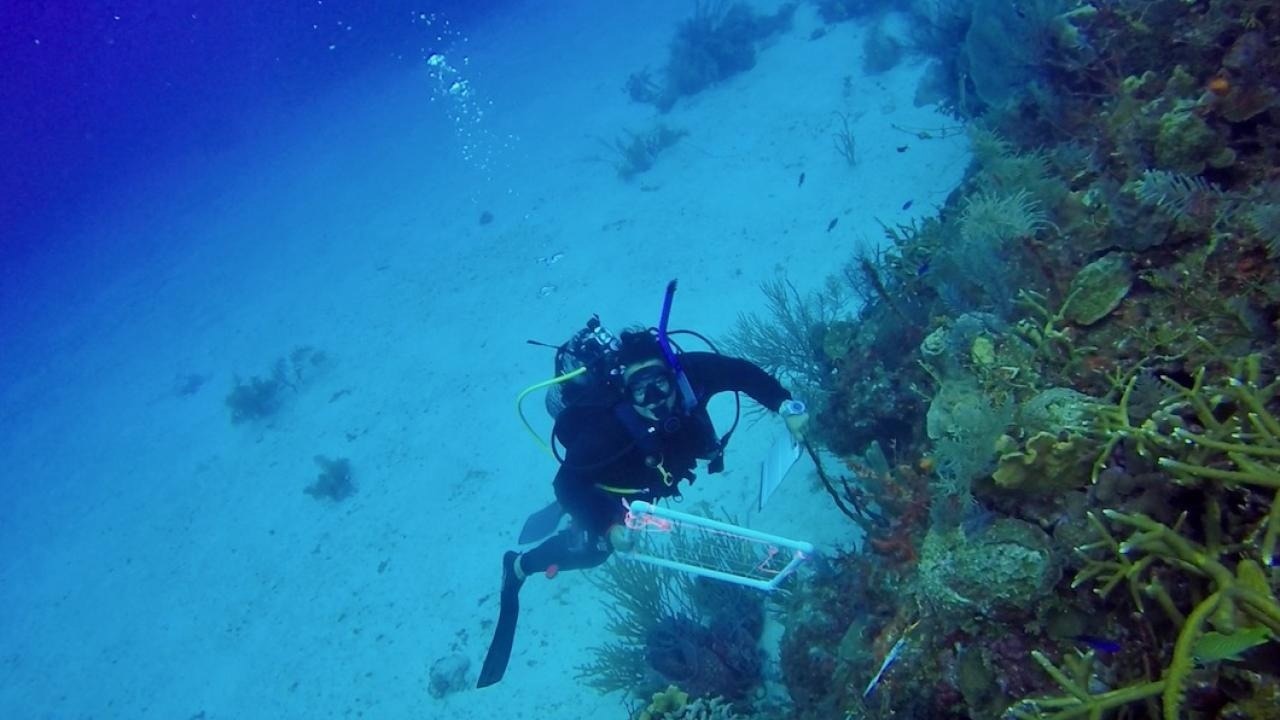Reviewed by Aimee MolineuxNov 23 2022
Disease-resistant corals can help “rescue” more vulnerable corals in the appropriate living conditions, according to a study from the University of California, Davis, which investigated a disease outbreak at a coral nursery in Little Cayman, Cayman Islands.
 UC Davis Assistant Professor Anya Brown dives in a coral reef in Little Cayman as part of a research study. Image Credit: Julie Meyer/University of Florida.
UC Davis Assistant Professor Anya Brown dives in a coral reef in Little Cayman as part of a research study. Image Credit: Julie Meyer/University of Florida.
The research, published in the journal Scientific Reports, discovered that when corals of the same genotype, or genetic makeup, are grown together, they are more susceptible to disease than corals grown amid a range of genotypes. The study also discovered that resistant genotypes could “rescue” some vulnerable corals.
We saw that some corals were more resistant to disease just by being around other corals that were particularly resistant. Proximity to these resistant genotypes helped buffer the susceptible corals from the effects of the disease.
Anya Brown, Study Lead Author and Assistant Professor, Bodega Marine Laboratory, Department of Evolution and Ecology, University of California, Davis
The results show that corals with greater genetic diversity are less likely to contract diseases. They also highlight the need to consider how corals are placed in nurseries and during reef restoration efforts to stop the spread of disease.
Coral Exam
The Central Caribbean Marine Institute, a nonprofit organization, and the study's academic authors collaborated to monitor the population of the critically endangered Caribbean staghorn coral, A. cervicornis, after a white band disease outbreak spread across its coral nursery in Little Cayman.
Prior to the outbreak, the nursery had glued coral fragments to PVC plastic frames to proliferate them. Some of the frames included coral from a single donor colony. Other frames housed corals from multiple donor colonies with a variety of genotypes.
The scientists determined that corals living on frames with a mixture of genotypes were significantly more resistant to white band disease. This detrimental bacterial disease nearly wiped out A. cervicornis in the 1980s, after documenting the presence of the disease across 650 coral fragments for more than five months.
Diversity and Disease Resistance
The potential of resistant coral to help safeguard vulnerable individuals works similarly to how vaccinations function in humans: vaccinated individuals fight a disease, constructing a barrier that decreases the disease's ability to pass through them and on to the next susceptible individual.
In terms of genetic diversity, agricultural lands offer an alternative comparison: Monocrops, where the same crop is sowed in the same location each year, become more prone to disease than varied systems. This study implies that a similar mechanism is at work among coral reefs in the ocean.
An Ideal Arrangement
Brown believes that these ideas and findings will be used in coral nursery and reef restoration projects.
I hope people working with coral nurseries use this as a springboard to see how this influences the spread of disease. Nurseries that intentionally arrange corals with mixtures of genotypes can help corals vulnerable to disease thrive. This can help build coral resilience by repopulating reefs with a diverse genetic mixture of corals.
Anya Brown, Study Lead Author and Assistant Professor, Bodega Marine Laboratory, Department of Evolution and Ecology, University of California, Davis
The co-authors include Dagny-Elise Anastasiou, Sophia MacVittie and Carrie Manfrino of Central Caribbean Marine Institute; Monica Schul, Lindsay Spiers and Julie Meyer of University of Florida; and Thomas Frazer of University of South Florida.
The research was funded by the John H. and Katherine C. Ewel Fellowship, the University of Florida and the Central Caribbean Marine Institute.
Journal Reference:
Brown, A. L., et al. (2022) Mixtures of genotypes increase disease resistance in a coral nursery. Scientific Reports. doi.org/10.1038/s41598-022-23457-6.